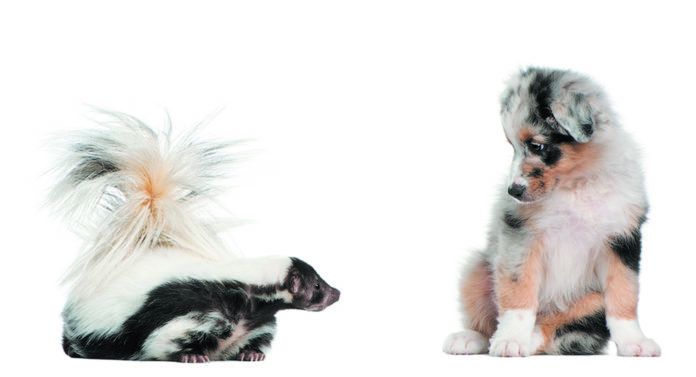Your dog has been sprayed by a skunk. The most effective way to get rid of the stench is to
- a. bathe your pet in tomato juice.
- b. your pet in a combination of hydrogen peroxide, baking soda, and dishwashing detergent.
- c. bathe your pet in cider vinegar diluted with water.
There is no shortage of solutions on the Internet for expunging your dog of the smell of skunk spray. And since skunks live pretty much wherever dogs do, there’s a reasonable chance you’ve ending up doing your own search. Who can blame you? That super-pungent, noxious odor that skunks leave behind when spraying in self-defense can be pretty overwhelming, to the point of stinging the eyes and leaving a burning sensation in the throat. Some have described the scent as akin to a mix of rotten eggs and burning tires.
Skunks are not looking for trouble. They’re pretty docile, actually. But they do not see well, so if they feel another animal is not heeding their warning of a foot stamp, hiss, and tail-raise, they’ll “shoot.” And they have expert aim, capable of reaching their mark from up to 15 feet away. Such incidents generally take place at night — skunks are nocturnal.
Single best solution
Tomato juice and vinegar are not effective skin odor neutralizers. The way to go is with a combination of hydrogen peroxide, baking soda, and yes, dishwashing detergent combined in a large open bucket. (The bucket must be open because the oxygen gas released by the solution can cause a closed container to explode.) Use the following amounts:
- 1 quart 3% hydrogen peroxide (often sold in pint bottles, so you’ll need two)
- ¼ cup baking soda (not washing soda, which can burn your dog’s skin)
- 1 to 2 teaspoons liquid dishwashing detergent
If your dog is large, you may need to double or triple the ingredients.
- Wearing rubber gloves, immediately apply the solution to your dry dog, working it well into his fur. You have to act fast because the mixture loses its effectiveness if you let it stand. Make sure to keep it away from his eyes.
- Let it sit for five to 10 minutes. Then rinse thoroughly with tepid water.
- Repeat if necessary and finish by bathing your dog with his usual shampoo.
This may not work perfectly — you might still smell some skunk. And the mixture could temporarily bleach your dog’s hair. But the odor is going to be a lot weaker — and dissipate sooner — than it would otherwise.
Most of the time the awful odor on your dog is all you have to worry about. But a dog sprayed directly in the face by a skunk might develop mouth ulcers. Don’t worry about those. They’ll heal with no permanent complications.
If a dog is sprayed in the eyes, he might experience tearing, superficial ulcerations, and even temporary blindness (think of the effects of tear gas). The effects will reverse themselves, although if your pet’s eyes appear irritated or red after he has been sprayed, flush them with cool water as quickly as possible to help lessen the effects. If you have any doubt, get your pet to the veterinarian’s office; eye health is not something you want to take chances with.
We should note that if the exposure is severe enough, skunk spray can theoretically interfere with the structure of a dog’s hemoglobin, causing a type of anemia that results in lethargy. But such a threat is exceedingly rare.





